#taylor swift lyric analysis
Text
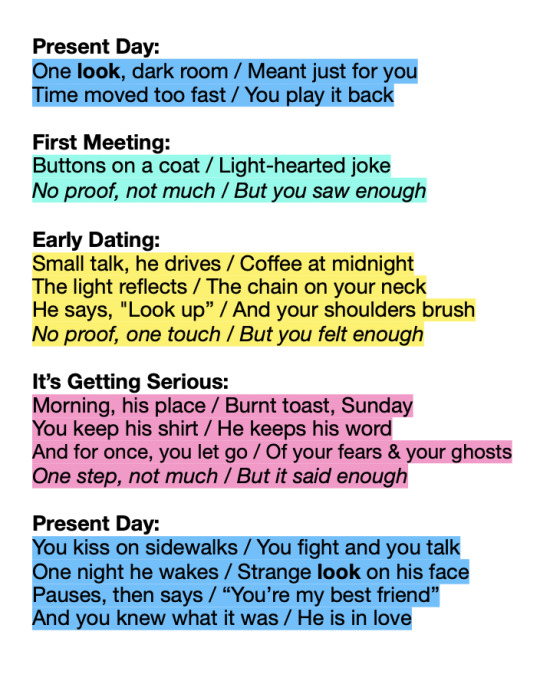
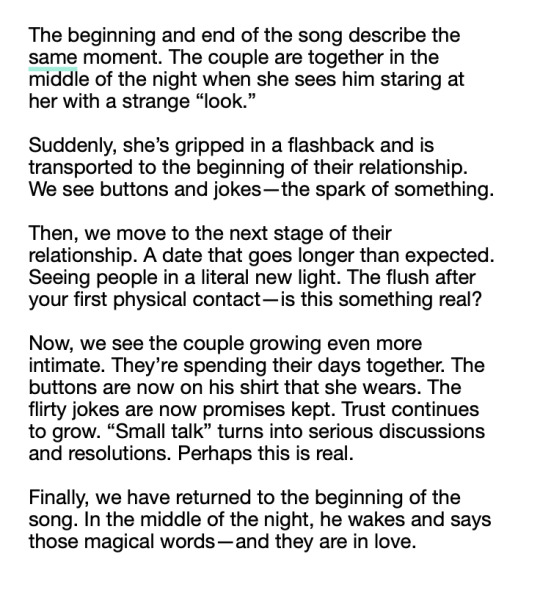
the storytelling in “you are in love” is magical
210 notes
·
View notes
Text
Before folklore came out, I would tell people that liking Taylor Swift was the straightest thing about me. Then folklore, evermore, and Red TV came out. As I saw the queer themes in those albums, I began seeing them in reputation, 1989, Speak Now, Fearless, and debut. The themes have always been there, fluctuating in subtlety but steadily increasing since 1989. So why did I think of Taylor Swift as so quintessentially straight? You guessed it: Compulsory heterosexuality and heteronormativity.
Taylor was supposed to be universally relatable. When she explained her songs, she refrained from using gender-specific language. Us. We. That person. Someone. And people that as “Me. I. A man. That guy I told everyone I was dating.” We were told she dated men, and a woman dating a man = heterosexual. No other options.
Even now, Genius will remove lyric annotations that imply her lyrics might not be about a man. Even with Hits Different, Question…? and Maroon. Taylor says reputation is about Joe and swifties believe her bc “Taylor wouldn’t lie to us!!!” even though there’s so many inconsistencies with the narrative that Rep is about Joe.
To say outright or even imply that Taylor might write songs about women because she likes women is met with scores of comments about how we “shouldn’t speculate on her sexuality!!! she said she’s straight!!! stop being disrespectful!!!!” But Taylor, as she has never said the words “I’m gay” has never said the words “I’m straight.” What she has done is align herself with. LGBTQ artists (YNTCD music video, Phoebe feat., posting support for queer musicians on social media, and, of course, the Pride parade that is her list of openers for the Eras Tour).
If Taylor didn’t people thinking she’s queer, she would’ve thrown in “as a straight woman…” in her speech before performing Delicate at multiple Pride events, when being interviewed about her advocacy during the Lover era, or at literally any point in her adult life.
Writing about women from the male perspective is queer. Her dressing in drag for the Man music video and showing herself in bed with a woman is inherently queer. The way she writes songs about her love interests’ girlfriends is queer. People bend over backwards to justify the gay shit she does, the same thing people have done for centuries with Sappho, Emily Dickinson, Louisa May Alcott, and so many sapphic artists throughout history. Taylor Swift is THE songwriter of our generation. She IS the music industry. But swifties, and hetlors all the more, would rather believe she is stupid and ignorant rather than intentionally using phrases like “hairpin drop,” “lavender haze,” “all the bricks they threw at me,” “you’re the West Village.” When she describes her muses as having scarlet lips, having hair that falls into place like dominos and braids in a pattern, gorgeous, it’s just because she thinks men are really pretty I guess (insert MetGala 2016 Joe photo). When she describes men as toys, playthings, “dudes who give nothing,” she’s being satirical. When she says “weird rumors,” that can’t possibly refer to rumors about marriage, pregnancy, or her having had multiple children during the pandemic. It’s *weird* to say that Taylor is queer. It’s weird and bad and gross. Why? Because people saying this believe being queer is weird, bad, and gross.
But it’s not weird. Being queer is beautiful, a gift. And that gift comes with a world that hates who we are. Of course Taylor is too soft for all it. And I admire her softness, that she continues to write vulnerable music. Midnights (esp 3am Edition and Hits Different) holds her loudest lyrics. She’s never beating the rumors and she doesn’t want to. Even if she never says the words “I’m gay/bi/pan/a lesbian,” the eardrum-shattering volume of her lyrics is more than enough for me.
#gaylor swift#gaylor#taylor swift lyric analysis#queer#question…?#maroon#hits different#i swear you could hear a hairpin drop#midnights
1K notes
·
View notes
Text
Taylor Swift’s single era on Midnights, a lyric analysis
Here’s the thing: I think Taylor Swift has been in her single era for the past few months and she’s already told us about it on Midnights. Here’s an exploration of this theme on the album. (This is a long post but worth it.)
Dear Reader
Let’s start with Dear Reader because the outro is screaming that she’s single. The way Taylor Swift uses her own motifs that she’s been building across her entire career to really hammer this message home that she is alone just destroys me.

To Taylor, going home is going home to a lover. It’s the physical act of making a house a home. It is this gentle, comforting, cozy kind of love. Her specifying that she’s going a house instead of a home underlines that she’s alone. She is physically in a house, but she is not emotionally at home. And no one would take her word for it because her being alone is counter to the public narrative of her six-year relationship.

And just in case she wasn’t clear enough already, she emphasizes that she’s alone yet again by bringing in another of her motifs: that love is a game.
She is no longer playing a two-player game. She’s playing solitaire, which says in the name of the game itself how solitary it is. And then, to underscore this even further, absolutely no one is watching and seeing her play this game. (I have so many more thoughts on this lyric alone, but to avoid tangents here, I’ll write a different post to discuss that further at some point.)
So, with these two lyrics, she has established and emphasized several different ways that she’s alone. She’s single.
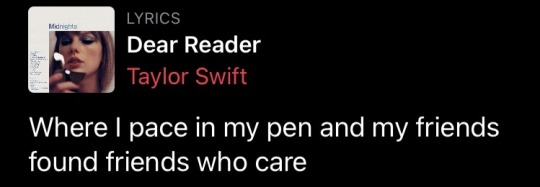
Now, let’s look at the lyric in between the two above. This is describing her feeling trapped in her own house. Here’s where Eras Tour visuals come in to align with this song.
‼️ Spoiler warning for eras tour visuals
Going “home” to Taylor has a specific meaning but so does a “house” because of the Lover House that represents her entire body of work so far. The Lover House is the house that Taylor built (or bought with the songs she wrote as she says in the Miss Americana documentary). It’s very significant that she is literally burning down the Lover House every single night at tour, and this lyric in Dear Reader gives more context to this visual.
In Dear Reader, the house is trapping her. Across all her work, Taylor has written over and over about cages and fences and boxes to evoke the feeling of being trapped. I find the use of the word “pen” here to be a very specific choice. "Pen” both means a physical pen locking something away as well as a writing instrument. She feels trapped inside this house that she built with her own writing.
I don’t think she resents her past work — but the narrative the public has created for her from it. Her early work is characterized by fairytale romances and idealizing the idea of marriage as a happy ending. And now, so many people keep expecting her to get married and have kids and retire so she can live out that narrative in real life. But as seen in other songs on Midnights like Lavender Haze, she’s decided that life isn’t for her.
So, she is burning down the Lover House, which represents the pen she feels trapped in, in order to be freed of the expectations the public has for her and have more control of her own public image and narrative.
Lavender Haze
The idea of feeling boxed in or trapped by societal roles and the public’s expectations is exemplified in Lavender Haze.
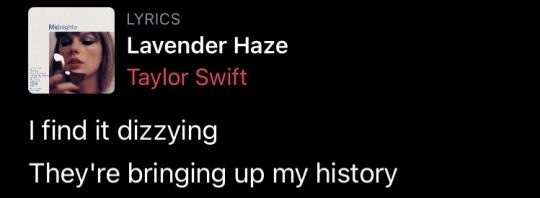
Her history is the Lover House and her career and the muses people assign to all of those songs. This is also her history of having written about an idealized version of marriage as a picture perfect happy ending. That is the standard to which a lot of the public is holding her to well over a decade later.

And now, she’s telling the public that she no longer wants that idea of marriage or that kind of happy ending. The lyric above is a critique of the entire societal standard that still categorizes women into two distinct boxes: either you’re the femme fatale temptress or the doting housewife. And she’d rather talk about anything else than whether or not she’ll get married.

She’s damned, or trapped, if she cares about the public’s expectations. She’ll be shoved into one of those two boxes: the temptress that can’t ever hold down a man or a doting housewife that’s expected to retire from her highly successful career in order to have children and that perfect happy ending.
And she especially does not want to be the housewife type figure. She directly says that doesn’t want that 1950s shit. It’s clear to me from this song that she wants to be successful in her career and just be herself without having all these expectations and gender roles forced upon her.
Lavender Haze is all about rejecting the traditional idea of marriage and charting her own path in life that’s outside of the public’s expectations. And the music video’s visuals support this, especially when the last shot is of her alone and seemingly happy without a lover.
This theme of rejecting the narrative that the public wants for her exists throughout Midnights because the album is about nights across her life, and her entire life has been shaped by her relationship with fame.
Midnight Rain
Obviously, the song that most directly echoes Lavender Haze in terms of rejecting the idea of marriage is Midnight Rain.
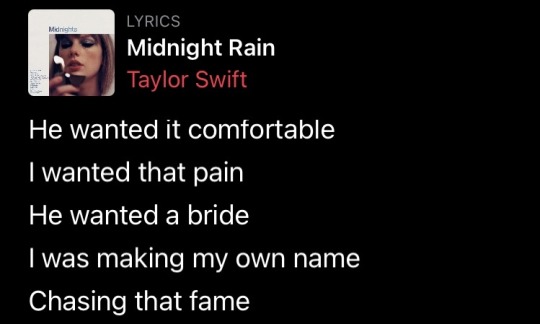
I don’t think Midnight Rain is about a recent time in her life, but she still chose to include a song about this on the album to further contribute to this theme of taking her narrative into her own hands. Midnight Rain positions Taylor as a complete opposite to the lover in the song — and by extension her career as opposite to that idealized fairytale happy ending type of romance.
Bejeweled
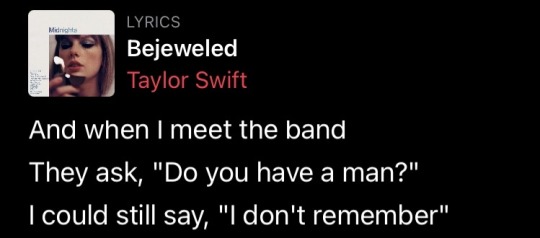
The entirety of Bejeweled sounds like it’s reflecting on a break up and getting back out there afterward. But for being in her single era, this one lyric stands out. And if you change the punctuation in “I don’t remember,” it can have two different meanings.
“I don’t remember” = whether or not she has a man is so unimportant she doesn’t remember for sure if she does or not
“I don’t, remember?” = I don’t have a man, why don’t you remember that?
The Bejeweled music video is also directly countering the fairytale happy ending romance. It’s a retelling of Cinderella where she ends up happy and alone. She literally turns down a proposal from the prince so that she can have her castle she won with her talent all to herself with her dragons/cats. That’s very single era to me.
You’re On Your Own, Kid
YOYOK is basically a pep talk she’s giving to her self about how she’s always been alone and how she can still be okay being alone. (cw: ed mention)
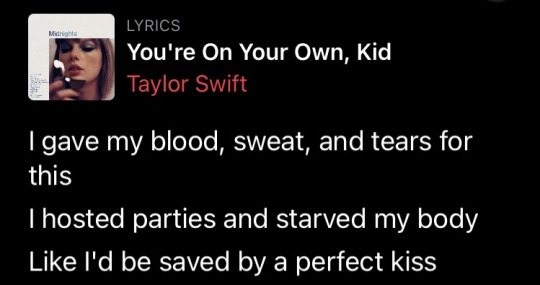
This specific lyric gets me because it’s once again a rejection of that idealized fairytale happy ending. Romance isn’t going to suddenly heal her like in the stories because real life isn’t a fairytale. Perfect magical kisses don’t exist.
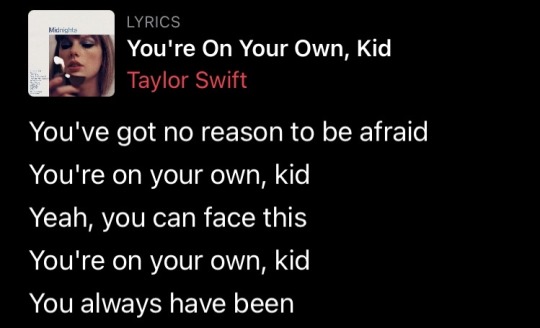
At the end of the song, she realizes she’s always been alone and that’s a source of comfort. She’s always had the tools to handle whatever life throws at her all on her own.
Taylor Swift is in her single era, and that’s okay!
I realize after writing all this out that it sounds like she’s sad in being single, but I don’t think she is. Every single one of these songs, aside from Dear Reader, has an upbeat note to it in the production and melody as well as some of the lyrics. Dear Reader can come back around to being upbeat with the Eras Tour visuals of her burning down the Lover House and being freed from everyone’s expectations.
Each and every piece of this is an example of her reclaiming her narrative for herself — and working to define her career not by any of her relationships or the public’s expectations, but by what she wants and her talent and her artistry. She wants to stand alone and proud on her own. That is definitely a happy thing.
#taylor swift lyric analysis#eras tour spoilers#cw: ed mention#taylor swift lyrics#taylor swift analysis#midnights#dear reader#lavender haze#lover house#taylor swift#bejewled music video#Taylor swift is a poet goddamnit#tswift motif: home#tswift motif: love is a game#I’m personally so ready for her single era
23 notes
·
View notes
Text
The singing connection between Dress and Cornelia Street of falsetto because he carved his name into her bedpost in her cornelia street home. The almost seamless cross fade from Dress to Cornelia Street because They were drunk in the bathtub in her cornelia street home. Now I wake up by your side in my cornelia street home. If I get burned at least we were electrified because this relationship really means something special, so special that I'd never walk cornelia street again.
#cornelia street x dress#taylor swift dress#taylor swift cornelia street#taylor swift lyric analysis#tay
15 notes
·
View notes
Text
𝘼𝙡𝙡 𝙩𝙝𝙚 𝙩𝙞𝙢𝙚𝙨 𝙏𝙖𝙮𝙡𝙤𝙧 𝙧𝙚𝙛𝙧𝙚𝙣𝙘𝙚𝙨 𝙝𝙚𝙧 𝙨𝙤𝙣𝙜𝙨 𝙞𝙣 𝙡𝙮𝙧𝙞𝙘𝙨 𝙥𝙖𝙧𝙩 2

𝐂𝐚𝐫𝐝𝐢𝐠𝐚𝐧 : 𝑊ℎ𝑒𝑛 𝑦𝑜𝑢 𝑎𝑟𝑒 𝑦𝑜𝑢𝑛𝑔 𝑡ℎ𝑒𝑦 𝑎𝑠𝑠𝑢𝑚𝑒 𝑦𝑜𝑢 𝑘𝑛𝑜𝑤 𝑛𝑜𝑡ℎ𝑖𝑛𝑔
𝐁𝐞𝐭𝐭𝐲 : 𝐼'𝑚 𝑜𝑛𝑙𝑦 17 𝐼 𝑑𝑜𝑛'𝑡 𝑘𝑛𝑜𝑤 𝑎𝑛𝑦𝑡ℎ𝑖𝑛𝑔 𝑏𝑢𝑡 𝐼 𝑘𝑛𝑜𝑤 𝐼 𝑚𝑖𝑠𝑠 𝑦𝑜𝑢

𝐂𝐚𝐫𝐝𝐢𝐠𝐚𝐧 : 𝐴𝑛𝑑 𝑤ℎ𝑒𝑛 𝐼 𝑓𝑒𝑙𝑡 𝑙𝑖𝑘𝑒 𝐼 𝑤𝑎𝑠 𝑎𝑛 𝑜𝑙𝑑 𝑐𝑎𝑟𝑑𝑖𝑔𝑎𝑛 ....
𝐁𝐞𝐭𝐭𝐲 : 𝑠𝑡𝑎𝑛𝑑𝑖𝑛𝑔 𝑖𝑛 𝑦𝑜𝑢𝑟 𝑐𝑎𝑟𝑑𝑖𝑔𝑎𝑛 , 𝑘𝑖𝑠𝑠𝑖𝑛𝑔 𝑖𝑛 𝑚𝑦 𝑐𝑎𝑟 𝑎𝑔𝑎𝑖𝑛

𝐂𝐚𝐫𝐝𝐢𝐠𝐚𝐧 : 𝐻𝑖𝑔ℎ ℎ𝑒𝑒𝑙𝑠 𝑜𝑛 , 𝑐𝑜𝑏𝑏𝑒𝑙𝑠𝑡𝑜𝑛𝑒𝑠
𝐁𝐞𝐭𝐭𝐲 : 𝐼 𝑤𝑎𝑠 𝑤𝑎𝑙𝑘𝑖𝑛𝑔 ℎ𝑜𝑚𝑒 𝑜𝑛 𝑏𝑟𝑜𝑘𝑒𝑛 𝑐𝑜𝑏𝑏𝑙𝑒𝑠𝑡𝑜𝑛𝑒𝑠

𝐋𝐨𝐯𝐞 𝐬𝐭𝐨𝐫𝐲 : 𝐼 𝑠𝑛𝑒𝑎𝑘 𝑜𝑢𝑡 𝑡𝑜 𝑡ℎ𝑒 𝑔𝑎𝑟𝑑𝑒𝑛 𝑡𝑜 𝑠𝑒𝑒 𝑦𝑜𝑢
𝐂𝐫𝐮𝐞𝐥 𝐬𝐮𝐦𝐦𝐞𝐫 : 𝑠𝑛𝑢𝑐𝑘 𝑖𝑛 𝑡ℎ𝑟𝑜𝑢𝑔ℎ 𝑡ℎ𝑒 𝑔𝑎𝑟𝑑𝑒𝑛 𝑔𝑎𝑡𝑒

𝐈𝐧𝐯𝐢𝐬𝐢𝐛𝐥𝐞 𝐬𝐭𝐫𝐢𝐧𝐠 : 𝑠𝑜𝑚𝑒𝑡ℎ𝑖𝑛𝑔 𝑤𝑟𝑎𝑝𝑝𝑒𝑑 𝑎𝑙𝑙 𝑚𝑦 𝑝𝑎𝑠𝑡 𝑚𝑖𝑠𝑡𝑎𝑘𝑒𝑠 𝑖𝑛 𝑏𝑎𝑟𝑏𝑒𝑑 𝑤𝑖𝑟𝑒
𝐓𝐨𝐥𝐞𝐫𝐚𝐭𝐞 𝐢𝐭 : 𝑊ℎ𝑒𝑟𝑒'𝑠 𝑡ℎ𝑒 𝑚𝑎𝑛 𝑤ℎ𝑜' 𝑡ℎ𝑟𝑒𝑤 𝑏𝑙𝑎𝑛𝑘𝑒𝑡𝑠 𝑜𝑣𝑒𝑟 𝑚𝑦 𝑏𝑎𝑟𝑏𝑒𝑑 𝑤𝑖𝑟𝑒 ?

𝐋𝐨𝐯𝐞 𝐬𝐭𝐨𝐫𝐲 : 𝑅𝑜𝑚𝑒𝑜 𝑡𝑎𝑘𝑒 𝑚𝑒 𝑠𝑜𝑚𝑒𝑤ℎ𝑒𝑟𝑒 𝑤𝑒 𝑐𝑎𝑛 𝑏𝑒 𝑎𝑙𝑜𝑛𝑒 , 𝐼'𝑙𝑙 𝑏𝑒 𝑤𝑎𝑖𝑡𝑖𝑛𝑔 𝑎𝑙𝑙 𝑡ℎ𝑒𝑟𝑒'𝑠 𝑙𝑒𝑓𝑡 𝑡𝑜 𝑑𝑜 𝑖𝑠 𝑟𝑢𝑛 / 𝐼𝑡'𝑠 𝑎 𝑙𝑜𝑣𝑒 𝑠𝑡𝑜𝑟𝑦 𝑏𝑎𝑏𝑦 𝑗𝑢𝑠𝑡 𝑠𝑎𝑦 𝑦𝑒𝑠
𝐂𝐚𝐥𝐥 𝐢𝐭 𝐰𝐡𝐚𝐭 𝐲𝐨𝐮 𝐰𝐚𝐧𝐭 : 𝑌𝑜𝑢 𝑑𝑜𝑛'𝑡 𝑛𝑒𝑒𝑑 𝑡𝑜 𝑠𝑎𝑣𝑒 𝑚𝑒 𝑏𝑢𝑡 𝑤𝑜𝑢𝑙𝑑 𝑦𝑜𝑢 𝑟𝑢𝑛 𝑎𝑤𝑎𝑦 𝑤𝑖𝑡ℎ 𝑚𝑒 / " 𝑌𝑒𝑠 "

𝐀𝐮𝐠𝐮𝐬𝐭 : 𝑅𝑒𝑚𝑒𝑚𝑏𝑒𝑟 𝑤ℎ𝑒𝑛 𝐼 𝑝𝑢𝑙𝑙𝑒𝑑 𝑢𝑝 𝑎𝑛𝑑 𝑠𝑎𝑖𝑑 𝑔𝑒𝑡 𝑖𝑛 𝑡ℎ𝑒 𝑐𝑎𝑟 ?
𝐁𝐞𝐭𝐭𝐲 : 𝑊ℎ𝑒𝑛 𝑠ℎ𝑒 𝑝𝑢𝑙𝑙𝑒𝑑 𝑢𝑝 𝑙𝑖𝑘𝑒 𝑎 𝑓𝑖𝑔𝑚𝑒𝑛𝑡 𝑜𝑓 𝑚𝑦 𝑤𝑜𝑟𝑠𝑡 𝑖𝑛𝑡𝑒𝑛𝑡𝑖𝑜𝑛 / 𝑆ℎ𝑒 𝑠𝑎𝑖𝑑 𝐽𝑎𝑚𝑒𝑠 𝑔𝑒𝑡 𝑖𝑛

𝐀𝐮𝐠𝐮𝐬𝐭 : 𝑆𝑜 𝑚𝑢𝑐ℎ 𝑓𝑜𝑟 𝑠𝑢𝑚𝑚𝑒𝑟 𝑙𝑜𝑣𝑒...
𝐁𝐞𝐭𝐭𝐲 : 𝐼𝑓 𝐼 𝑡𝑜𝑙𝑑 𝑦𝑜𝑢 𝑖𝑡 𝑤𝑎𝑠 𝑗𝑢𝑠𝑡 𝑎 𝑠𝑢𝑚𝑚𝑒𝑟 𝑡ℎ𝑖𝑛𝑔 ?

𝐓𝐡𝐞 𝐬𝐭𝐨𝐫𝐲 𝐨𝐟 𝐮𝐬 : 𝐼 𝑢𝑠𝑒𝑑 𝑡𝑜 𝑘𝑛𝑜𝑤 𝑚𝑦 𝑝𝑙𝑎𝑐𝑒 𝑤𝑎𝑠 𝑎 𝑠𝑝𝑜𝑡 𝑛𝑒𝑥𝑡 𝑡𝑜 𝑦𝑜𝑢
𝐋𝐨𝐯𝐞𝐫 : 𝐴𝑛𝑑 𝑎𝑡 𝑒𝑣𝑒𝑟𝑦 𝑡𝑎𝑏𝑙𝑒 𝐼'𝑙𝑙 𝑠𝑎𝑣𝑒 𝑦𝑜𝑢 𝑎 𝑠𝑒𝑎𝑡

8 notes
·
View notes
Text
CARDIGAN SUPERIORITY
‘august should’ve been the lead single of folklore,’ i said foolishly one march in a time not to be spoken of, ‘because cardigan is just a bad song’.
on the scope of things, it made sense.
1. august rejects previous narratives and explores newfound territory. i can’t think of someone who humanises the supposed ‘other woman’ in a relationship. other women are bitter sluts who ought to be mocked. what happens if they are sweet and senstivie and have their own narrative they wish to pursue?
2. august employs the spatial production of folklore, but with jack antanoff perfection that would’ve made for a smashing single.
3. august was a summer song- cardigan seemed like an ill-fated introduction talking about vintage tees and sequins and a poor reinassance of an accoustic reputation era.
when i first listened to cardigan, i did not understand. cardigan was about a poor girl in a love triangle. cardigan was about a girl poorly named betty who made the mistake of dating james. cardigan was just not it.
but it was not.
cardigan, lyrically, is brilliant. cardigan is about someone who breaks your heart, but breaks your heart because they made you feel accepted for who you were, for what you experienced. yet, they leave in the exact same way that they sought to combat, reinforcing both the loss of your support system but new reason to crave your support system. you drew stars around my scars but now i’m bleeding.
cardigan is about someone who tells you you don’t really know what you’re doing. when you are young you know nothing. but you do. cause i knew you.
i knew you, leaving at the very last moment that you could, steppin on the last train, and you know the effect is forever, like a bloodstain, something that incrimates you, something you feel you could’ve prevented, perhaps- a bloodstain in a court of law is damning evidence. perhaps a bloodstain means the damage was so severe, so violent, it drew blood. nonethless, there was a bloodstain and you know it but you were told you didn’t, because you were young.
betty wears cardigans- she seems this sweet, innocent type- she seems like the girl who gets cheated on, in the love triangle. in betty, james says she wears a cardigan. it’s her whole being- when she felt old, unusued and unwanted, james puts her on. you put me on and said i was your favourite. taylor’s clever word play- put me on means to informally decieve. you pretended that i was special. you pretended i was worth something. and you told me i was too young to know anything.
betty’s broken, heartbreak to this poor sweet girl is like leaving like a father. the men around her belittle her, high heels in cobblestones, symbolises a feeling of instablity, feeling fragile in her womanhood. peter losing wendy- childhood tales symbolise the loss of the innocence that frames her character. she clings to it; she wears cardigans. playing hide and seek reinforces this reference to her childhood, but once again- double meaning. he’s dubious, he’s not committing. i choose to believe betty rejects him. i don’t agree with taylor, that they get back together.
but betty is sweet- she still believes, chasing shadows in the grocery line.
and she knows.
i’d knew you come back to me.
the ending is ambigous- perhaps it suggests she takes him back. perhaps it reinforces the damage she has endured. but betty is hurt. betty cares. betty is sweet. betty does not dismiss august. betty dismisses james.
it is some of taylor’s best songwriting. it took me nearly 18 months to fully dissect the song, to digest it, to swallow it, to ponder it along beaches, in the grips of winter.
cardigan is so much more than a love triangle. it aged better than any other song on that album- it is depth- it punches you in the gut when you realise what she means. cardigan means to be innocent, to fall in love, to find meaning in someone and to lose that person.
and it is certainly taylor’s best written songs.
#cardigan#folklore#cardigansupremacy#stuffyoujames#taylor swift lyrics#lyric analysis#taylor swift lyric analysis#taylor swift
17 notes
·
View notes
Text
Dear Reader is a sequel to The Archer
6 notes
·
View notes
Text
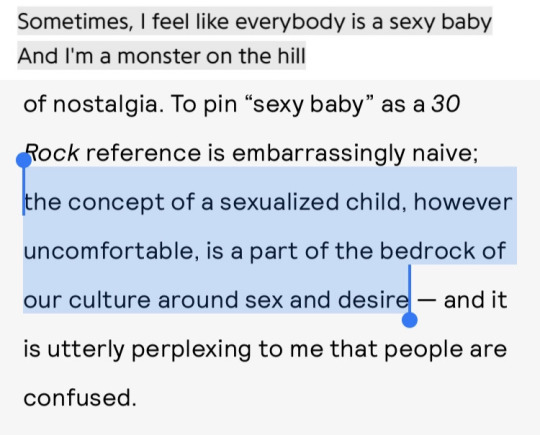
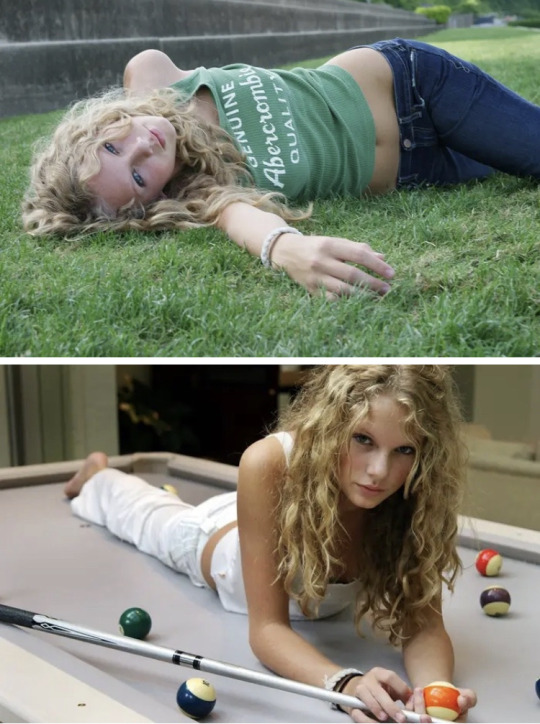

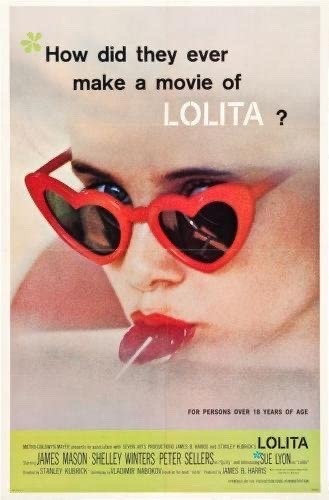

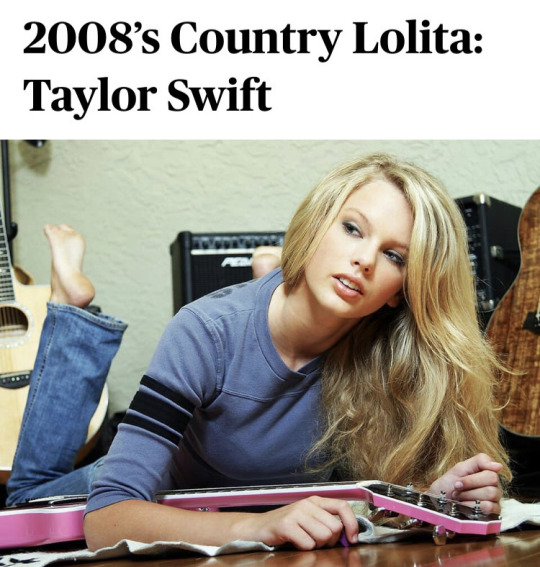
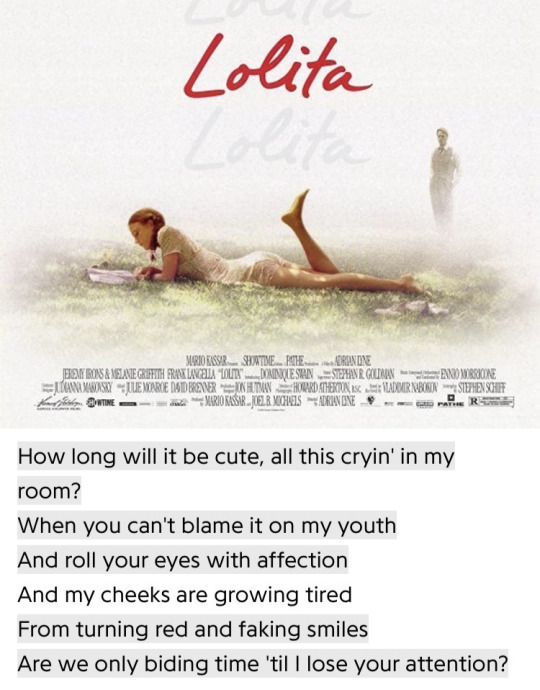
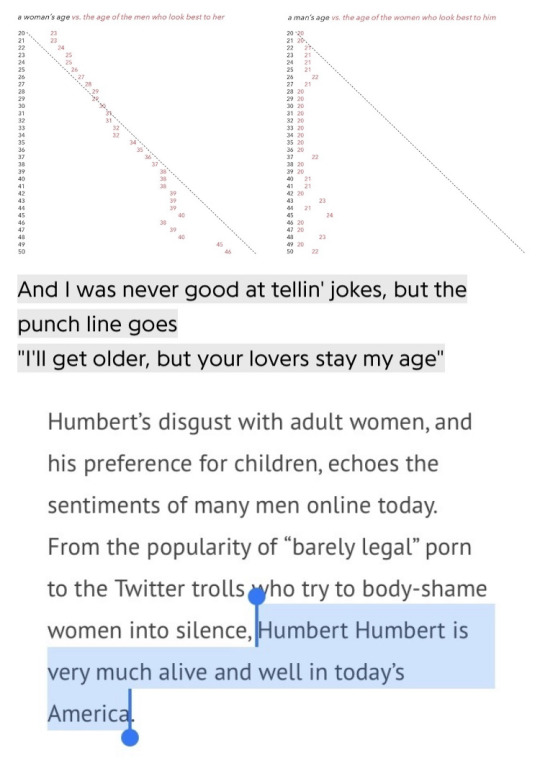

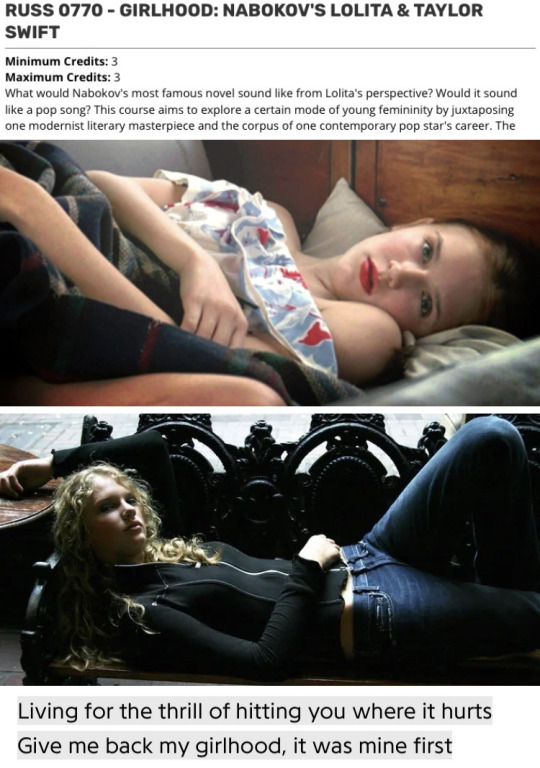
1. anti-hero, taylor swift / 2, 19. “taylor swift’s ‘sexy baby’ lyric is more than a ‘30 rock’ reference,” sophia june for nylon magazine / 3, 4, 12, 22. taylor swift ages 14-16, photographed by andrew orth / 5, 23. dominique swain age 15, photographed for lolita (1997) / 6, 17. “the fetishization of girlhood,” m.c. easton / 7. lolita (1962), dir. stanley kubrick / 8. 22 (mv), taylor swift / 9. anti-hero (mv), taylor swift / 10, 14, 18. nothing new, taylor swift ft. phoebe bridgers / 11. “2008’s country lolita: taylor swift,” gavin edwards for rolling stone / 13, 21. lolita (1997), dir. adrian lyne / 15. okcupid dating chart: age preferences by gender / 16. all too well (ten minute version), taylor swift / 20. university of pittsburgh 2021-2022 undergraduate catalog / 23. would’ve, could’ve, should’ve, taylor swift
apologies for this ridiculously long megathread, but i found a ton of these photographs of taylor from when before she was famous, around ages 14-16, and ooh boy, did they get me thinking…
sometimes i wonder if she just really lucked out with the mostly desexualized “innocent girl-next-door” persona becoming her brand throughout her early career, because it looks like things could have gone in a very different direction for her in another universe.
like you can literally see taylor being de-aged between her debut and fearless era as her public image cemented…the posing, the makeup, the hair, the clothing…it’s all very deliberate and sinister.
and now, all these years later, no one knows better than taylor herself that the most desirable thing a woman can be is not a woman, but a girl…a sexy baby, if you must.
her heart-shaped sunglasses, nothing new, the ten minute version of all too well, would’ve could’ve should’ve…she knows all about society’s sickness, its simultaneous fetishization and destruction of girlhood. she knows because she’s lived through it.
we don’t often categorize her or think of her as one, but she was a child star, and she barely escaped its curse. just barely. but unlike so many other child stars, unlike dolores haze, she survived with her voice and her pen, and she can see it all now, it was wrong.
#web weaving#parallels#connections#thread#taylor swift#midnights#midnights ts#dolores haze#swifties#girl blogger#girl blog#girlblogging#girlhood#lyrics#lyric analysis#nothing new#phoebe bridgers#dominique swaine#anti-hero#would’ve could’ve should’ve#all too well#all too well ten minute version#thoughts#feminism#feminist
6K notes
·
View notes
Text
I cannot stop thinking about "The Last Great American Dynasty"
There's an obscure, independent folk singer-songwriter whose work I've followed since she released a double album debut during the pandemic. It's all moody, introspective pop-folk - acoustic guitar and pianos against the occasional 808 beat.
While I'm clearly not the target audience, there is one song in particular that has stuck with me ever since the very first time I heard it.
Let's discuss.
Sources and further reading:
--- WIKIPEDIA ---
Rebekah Harkness: https://en.wikipedia.org/wiki/Rebekah_Harkness
Standard Oil: https://en.wikipedia.org/wiki/Standard_Oil
High Watch: https://en.wikipedia.org/wiki/High_Watch
John D. Rockefeller: https://en.wikipedia.org/wiki/John_D._Rockefeller
The Ludlow Massacre: https://en.wikipedia.org/wiki/Ludlow_Massacre
The Homestead Strike: https://en.wikipedia.org/wiki/Homestead_strike
--- ARTICLES ---
Vogue - The Outrageous Life of Rebekah Harkness: https://www.vogue.com/article/the-outrageous-life-of-rebekah-harkness-taylor-swifts-high-society-muse
Small State Big History - Rebekah Harkness, the Scorned Socialite of Watch Hill : https://smallstatebighistory.com/rebekah-harkness-the-scorned-socialite-of-watch-hill/
St. Louis Magazine - The story of Rebekah Harkness is way more complicated than Taylor Swift lets on: https://www.stlmag.com/culture/music/the-last-great-american-dynasty-rebekah-harkness/
St. Louis Style - Who is Rebekah Harkness and Why is She the Star of Taylor Swift’s ‘The Last Great American Dynasty’?: https://www.stlouis.style/throwback-thursday/who-is-rebekah-harkness-and-why-is-she-the-star-of-taylor-swifts-the-last-great-american-dynasty/
SF Gate - Everything you think you know about the Winchester Mystery House probably isn't true: https://www.sfgate.com/bayarea/article/real-story-of-sarah-winchester-mystery-house-12552842.php
New York Times - IS THERE A CHIC WAY TO GO?: https://www.nytimes.com/1988/05/22/books/is-there-a-chic-way-to-go.html?pagewanted=all&src=pm
#tbskyen#tb skyen#video essay#taylor swift#last great american dynasty#essay#song analysis#lyric analysis
220 notes
·
View notes
Text
‼️I think a great message Taylor put in ttpd is that she’s mad at the fans…and good for her. Many fans still don’t see her as human, as a real person, just some toy they can manipulate to entertain them and fit their narrative. Many fans think their entitled to her personal life too: the letter for her to stop dating matty (yes I think Matty sucks but that was just weird af), speculation on who each song is about, the extreme discourse after her and joe broke up, the gaylor shit, even the talk about her and Travis. Taylor is finally saying it is weird to talk about REAL PEOPLE like that, like they’re tv show characters or your little toys. None of us are entitled to Taylor’s personal life and it is extremely odd to believe you should have a say in it. As Taylor says, NO the fans cannot come to the wedding, because we’re JUST FANS. Even now, some swifties need to see Taylor doesn’t know you, she’s not your best friend, not your sister. She makes music for us. She’s not trying to be a little circus for you to direct.
anyways, taylor is a real human, not a puppet. her personal life is hers, not your circus. and taylor doesn’t know you. she appreciates the fans for giving her her career, for listening to the music, but she has never met you; she. is. not. your. friend.‼️
#sorry for the rant…but…yeah#taylorswift#ttpd#taylor swift#taylornation#the tortured poets department#but daddy i love him#swifties#t swift#taylor nation#taylorstans#taylor swift eras#taylor swift ttpd#ts ttpd#so long london#icdiwabh#tortured poets department#taylor swift analysis#lyrics#fortnight#ttpd era#the anthology#ts11#txt#txt post
166 notes
·
View notes
Text
High Infidelity is about Miss Americana.
Notes before we begin: First, I can’t post screenshots from the doc bc Netflix, but I have pulled direct quotes and rewatched scenes over and over as I wrote this analysis. The more I watched, the more this theory made sense.
Second, while I obviously don’t know what Taylor Swift’s relationship with her dad is like, the clips in Miss American plus the song tolerate it are enough to convince me that he’s not/wouldn’t be accepting of Taylor being queer. There’s a reason she’s a mama’s girl. This is a Scott Swift hate account.
Let’s begin
Verse One
Lock broken,
A common interpretation of this lyric is the invasion of privacy that is someone reading your diary/journal. Having a locked diary is also something most common with young girls (only girls get privacy, sorry lads), and in Miss Americana, the first diary that Taylor shows in the first scene while she says the first words of the film is a diary that has a lock, and there’s also a closeup of another diary with a lock, as well as the words “bitch session.” There’s also the very common trope/reality of parents reading your diary. Speaking from personal experience, this can genuinely be traumatic, especially taking into consideration the next two words.
Slur Spoken
Seeing as Taylor is a white woman, I genuinely don’t know how else this can be interpreted besides a homophobic slur being spoken. $!u and b*!tch are derogatory, but that’s not the same thing as being a slur. Also, I’m not going to justify the “she’s talking about slurring words while drunk!!” interpretation bc that makes less sense than thinking the slur is “whore.” (I think the diary I mentioned that says “bitch session” is further proof that Taylor doesn’t consider ‘bitch’ to be a slur, even though she has called out the misogynistic way men use it in music.)
Wound open, game token
The person who is breaking this lock and speaking this slur and opening this wound is using Taylor’s pain as a means to get a prize. “You play stupid games you win stupid prizes” (MAATHBP), “You knew you won, so what’s the point of keeping score?” (hoax).
I didn't know you were keeping count
In the Man music video, during the tennis match, Scott Swift is playing the scorekeeper. This line is repeated multiple times in the song. The context of the repetition does change and develop throughout the song.
Rain soaking, blind hoping
I think this refers to the Lover era and how Taylor was not able to come out (specifically that video where she’s talking about ME! and looks sad as shit). I think it’s also a reference to Midnight Rain, rain being a metaphor for unexpected, unseen change, and also the isolation of staying hidden.
You said I was freeloading / I didn't know you were keeping count
As someone with a dad, I can confirm that this is very dad-coded. Like, I can’t think of a context in Taylor’s life where a romantic partner would’ve said this to her, especially considering how idk, rich and successful she’s been since she was a teenager? While I don’t think her dad would ever be justified in saying this to her either, it could be a reference to him throwing his role in her career in her face, the way we see in Miss Americana.
Chorus
This is where things come together in terms of being about Miss Americana.
High infidelity / Put on your records and regret me / I bent the truth too far tonight / I was dancing around, dancing around it
In order to produce a consumable product (the Lover journals) around her and her art, she had to dance around the full truth. The entries were meticulously chosen and most likely edited. In Miss Americana, the segment where she “comes out” as a democrat feels like it might’ve been a different kind of coming out story, especially when you factor in the creation of You Need To Calm Down. It comes across as extremely personal, and while there are multiple factors leading to the experience being emotionally charged for Taylor, I do think that her own queerness is one of those factors. The entire documentary feels like she’s dancing around a bent truth.
Put on your headphones and burn my city
Putting on headphones is shorthand for ignoring someone. “Burn my city” in the context of how Taylor equates her (former) lover with *a certain city* feels like an indication that the subject of the song did something to sabotage and burn down the relationship. I think this is a reference to how her career and the people controlling it (such as her father, but others as well) ruined the love she’s been singing about since reputation.
Your picket fence is sharp as knives
This also goes back to Midnight Rain (“my town was a wasteland, full of cages, full of fences”)
I was dancing around, dancing around it
Taylor has used dancing as a literary device throughout her discography. I believe it’s typically a metaphor for queerness.
Post Chorus
Do you really want to know where I was April 29th?
This goes back to the diaries from Miss Americana. This is Taylor being confronted about a journal entry from an April 29th where she wrote something gay. When *her dad* saw it, it led to a slur being spoken.
Do I really have to chart the constellations in his eyes?
This refers to the segment in Miss Americana that is allegedly all about Joe. Call It What You Want plays over a montage of videos filmed by an unseen lover. The only clip actually featuring Joe in the entire film is a single moment where Taylor and Joe look vaguely excited to see each other after one of the Rep shows. The way she wrote and sung this line makes it seem like charting constellations in some dude’s eyes is the last thing she wants to do.
Verse Two
Storm coming, good husband / Bad omen / Dragged my feet right down the aisle
This very much sounds like Taylor being forced to be romantically linked in a traditional, heterosexual way. The storm coming and bad omen are what led to her being pushed into this, likely the media storm that happened in 2016. It ties together the lines about pickets fences and how the rain referenced in the first verse is connected to Midnight Rain, because, as we learned with the very first track on Midnights, Taylor is not interested in 1950’s shit.
At the house lonely,
“To a house not a home all alone ‘cause nobody’s there,” Dear Reader
good money,
“the jokes weren’t funny, I took the money” from YOYOK is just one example of how the money comes at the cost of herself and who she is and her worth as a human being…
I'd pay if you'd just know me / Seemed like the right thing at the time
…but now she’s regretting paying that price, wishing that she could be truly known. It seemed like the right thing, but she’s realizing that it wasn’t. Alternatively, she regrets coming out to her and the price she now has to pay of knowing his love was conditional. She paid the price for being known. Also, during the clips that play during the segment allegedly about Joe, Taylor is singing Call It What You Want, specifically the lyric “At least I did one thing right” which is… devastating in this context. She also says:
But I wasn’t happy in the way that I was trained to be happy…It was happiness without anyone else’s input. It was just, we were happy.
Anyway she doesn’t seem happy anymore.
Pre Chorus
You know there's many different ways that you can kill the one you love / The slowest way is never loving them enough
This creates a strong connection to tolerate it. I feel like this lyric is the thesis of that song. Again, this is a very dad-coded lyric. It’s the slow realization that a parent’s love can be conditional. It’s like when a queer kid comes out and a parent says “I still love you, but…” There’s other contexts where that phrase could exist, but it’s an extremely common queer experience.
Do you really want to know where I was April 29th? / Do I really have to tell you how he brought me back to life?
I think this could refer to the narrative of Joe Alwyn being William Bowery (which is suspect at best and criminal at worst). She has to say that Joe helped her write devastating breakup songs like exile and champagne problems to keep up the narrative that they are in a VERY HAPPY relationship.
The next new lyric is in the third chorus and let’s just say I have thoughts about it.
Put on your records and regret meeting me
THIS LYRIC HAS BEEN DRIVING ME MAD FOR THREE MONTHS. In the other choruses she says “regret me,” but she changes it here to be “regret meeting me” in the last chorus. “Regret me” implies regretting the existence of Taylor Swift. It’s the people credited with kick-starting her career (such as her father!!!) putting on your records, a double-entendre for her albums + the awards and accolades she has earned for those albums. But! In this chorus! The lyric is! Regret meeting me! The promo for Midnights focused heavily on “meet me at midnight,” the concept that she would be showing who she really is with the album, so much so that people thought she might be coming out with this album. While I think this lyric is a reference to that narrative and the fear that her fans won’t get her or won’t like her after listening to Midnights, I also think it is about how her dad regrets learning who she really is, and how he therefore IGNORES IT by listening to the albums she wrote about me. This is the only lyric in the chorus that changes, and it’s seemingly such a small change, a single word added to the line, but that’s what makes it so massive. Because why would she change this lyric if not to completely change the meaning of the line? It’s drawing a distinction between regretting someone’s existence and regretting knowing the truth about them.
Oh, there's many different ways that you can kill the one you love
And it's never enough, it's never enough
I think the phrasing here implies that Taylor feels like she can never be good enough to earn the love she needs and deserves. This ties it, again, to the intro of Miss Americana where she’s going through her diaries and talks about how her main goal in life was to be a good girl.
Outro
The entire first chorus is repeated, and we have a new perspective.
You said I was freeloading
When it comes to this line specifically, I think it refers to the conversation about Taylor’s desire to speak publicly about politics, in which her dad throws in her face how he hired armored cars, essentially saying that she owes him something. It’s just phrased in an odd way and it makes everyone uncomfy.
I didn't know you were keeping count / But oh, you were keeping count
The repetition of the first chorus at the end of the song implies that this song is cyclical. It’s a loop that she’s trapped in. (If you put this song on repeat and turn up the crossfade, you can listen on a seamless loop). Tolerate It does the same thing. Repetition also draws attention to the lyrics while recontextualizing them. The last lyric (“but oh, you were keeping count”) is this acknowledgment that her relationship with this person was/is transactional.
What about the name of the song?
Okay, I’m convinced the only reason anyone would ever think this is a song about cheating is because of the title. Obviously, the primary definition of the word infidelity is cheating on a romantic or sexual partner. Nothing else in the song indicated cheating. SO. OBVIOUSLY. I GOOGLED. THE DEFINITION. TO SEE. WHAT. AN ALTERNATIVE. MIGHT. BE
unbelief in a particular religion, especially Christianity.
Jesus Fucking CHrist. Taylor Swift has called herself a Christian, and she has also written songs with overt religious themes, typically borrowing from Christianity specifically (Don’t Blame Me; False God; Would’ve, Could’ve, Should’ve; Soon You’ll Get Better). While I know that you can be queer and Christian, it is not unreasonable to conclude that coming out as queer to a conservative Christian (parent) would be considered a lack of belief in Christianity. Infidelity literally means “unfaithful.” To many people, Christianity and queerness are unreconcilable, to the point that they believe accepting yourself as queer can lead to you going to hell. While they won’t say this outloud, many Christians put “homosexuality” into a higher category of sin, meaning that being queer is HIGHLY UNCHRISTIAN, HIGHLY UNFAITHFUL, HIGH INFIDELITY.
One last thing. Miss Americana was released at midnight PST. Which is 3am EST. High Infidelity is a 3am track. So, yeah.
tl;dr
High Infidelity is about being considered unfaithful for being who you are. It’s about dying slowly because you are not loved (enough) for who you are. It’s about how the lies you’ve been forced to tell have forced you to be unfaithful to yourself. It’s about Miss Americana.
#gaylor#gaylor swift#taylor swift lyric analysis#high infidelity#midnights 3am edition#midnights#miss americana
204 notes
·
View notes
Text
1989 - The story of two muses
Back to my first and forever love – Lyric analysis!
1989 is very close to my heart, and I have always found it noticeable that this album has quite a contrast between love songs about a very up and down/anxiety filled relationship on one hand, and the very raw and heartfelt romance as portrayed in ‘This Love’ and YAIL on the other.
And the 5 new vault songs we have on Taylor’s version now have added quite a bit of detail to the picture that emerges and I’m more convinced than ever that there are two distinct relationships/muses being described and I fancied doing a deep dive into how each one is described in the music and how the themes connect to other songs. (And it may even explain the beach theme 😉)
Ok, so, I have actually sorted every song from 1989 that is about a romantic relationship, including the 5 new vault tracks, into this scheme (even though I found some really hard!)
Muse 1 – “The heartbreaker” This relationship is described as very up and down, very anxiety-driven, something you can’t walk away from like an addiction, “against your better knowledge but can’t help myself” kind of way. Taylor has described this person as ‘the one that might one day interrupt your wedding, because you’re never truly over’. Break up: ‘you left me’.
Muse 2 – “The one that came back” While this relationship is by no means described as perfect, it has a very different tone to it. It’s very much based in secure feelings, ‘us against the world’, any difficulty faced is worth it. Break up: ‘had to let it go’. And the person came back when it counted.
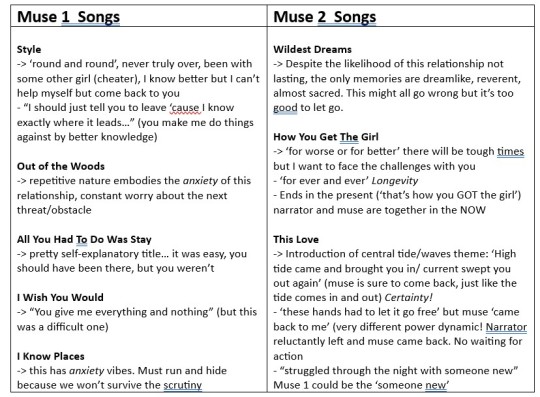

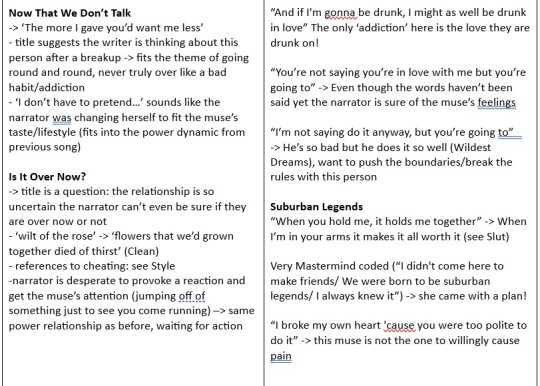
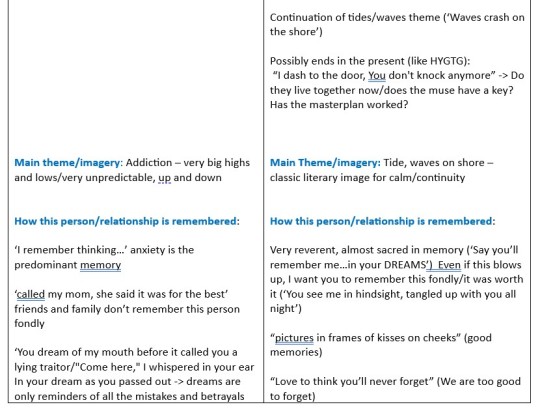
(Sorry about the pictures, I couldn't fit a table in any other way)
I am really impressed with how much just five new songs have furthered the story of these two relationships and I (personally) love how much this is filling in the blanks and makes everything make so much more sense. 'You can hear it in the silence' vs 'Now your silence has me screaming' almost killed me, honestly. She really found the love that needs no words. 🥰 And the direct contrast of the metaphors, one relationship as an addiction with very high highs and very low lows, and the other as the calm waves on the shore that continually come in and out with the tide, is just so masterfully done, I love it. And I think given the beach theme of the 1989 TV covers, we can guess which of the muses is being honoured in this re-branding.
Lyrical connections to later albums
Perhaps not surprisingly, these two muses and their lyrical themes show up again in Taylor’s music in later albums. The connection I’ve already seen a lot of people make is the playing cards reference from Say Don’t Go (‘I’m trying to see the cards that you won’t show’) linking to Cornelia Street (‘back when we were card sharks, playing games’). And I love how this tells the story of someone whose previous relationship impacts how they react in a new relationship. Because the person in Say Don’t Go really did lead her on and played her and then left, whereas the Cornelia Street muse didn’t but Taylor thought as much based on her previous experience (‘I THOUGHT you were leading me on…but then you called, showed your hand…’).
Another parallel to Lover songs is the ‘light in the dark’ theme that starts in This Love with “lantern burning/ flickered in my mind for only you”, which feels very similar to “chandelier still flickering here” from Death by A Thousand Cuts. This relationship/lover is the light that perseveres in the dark, even if it’s just flickering, it never goes out. It lights up the darkness (‘glowing in the dark’), whereas the other relationship is a “shot in the darkest dark”. We obviously get a whole lot more songs in later albums that reference love as light in the darkness, most prominently in Daylight, the Lover album closer. But more subtly, I also think that “Takin’ your time in the tangerine neon light” from Slut, and “hang your head low in the glow of the vending machine” from Cruel Summer follow that same pattern. Something that illuminates the darkness. And just btw, Slut and Cruel Summer give me a very similar vibe in terms of different takes on the same situation…anyone else get that? But one last, maybe more subjective, connection is the line “I’ll pay the price, you won’t”. Which everyone immediately took as a comment on double standards between men and women, but I think it could also be interpreted to mean ‘I’ll happily pay the price and take the hit, so you don’t have to’, if you interpret the song to be about dating a man in public to keep a female partner out of the public eye. With that in mind, the line becomes very reminiscent of ‘I can never give you peace’ from folklore, both expressing that Taylor wants to shield her lover from the media scrutiny that comes with dating her.
Suburban Legends alone has so many links to later songs that I had to give it its own paragraph. The chorus ‘I didn’t come here to make friends’ is so ‘I don’t want you like a best friend’ coded, and ‘We were born to be suburban legends’ gives me big reputation/big conversation vibes. Other people have already pointed out that ‘flushed with the currency of cool’ draws links to Gold Rush and Gorgeous (‘You’re so cool it makes me hate you so much’) and ‘so magnetic it’s almost obnoxious’ is very similar to ‘magnetic force of a man’ from Lover. All painting the picture of a person who is so cool and alluring that they feel almost unattainable. The whole premise of the song being that the narrator didn’t come to make friends, but instead is on a mission to get what they want, feels very Mastermind to me. The background music over the outro confirms that, as it’s the same production as Mastermind (I call it ‘game show music’ 😊) and the lyrics saying that the muse now doesn’t knock anymore, suggests to me that maybe the masterplan has worked. Lastly, the conclusion of the song being ‘my life is ruined/I always knew it’ is a different way of saying I’ll happily ruin myself for you, as in ‘for you I’d ruin myself a million little times’ from Illicit Affairs.
We don’t get nearly as many references to the first muse’s themes in later music, but ‘fell from the pedestal, right down the rabbit hole” from Long Story Short is a nice drawback to the wonderland theme. Bottom line though, ‘It was the wrong guy…’.
And there we have it, the story of the two muses of 1989. If anybody here is even remotely as excited by lyrical analysis as I am, this one is for you, and feel free to have a friendly chat in the comments if I’ve missed anything!
175 notes
·
View notes
Text
Taylor Swift lyrics that are Jason towards Bruce
"Never impressed by me acing your tests."
"They'll be happiness after you, but there was happiness because of you. Both of these things can be true."
"After giving you the best I had, tell me what to give after that?"
"I gave you all my best mes, my endless empathy, and all I did was bleed as I tried to be the bravest soldier."
"I got nothing to believe unless you're choosing me."
#dc#dc comics#comics#comic books#character analysis#character dynamics#jason todd#red hood#bruce wayne#batman#batfam#batfamily#batkids#taylor swift#dear john#happiness#you're losing me#songs#lyrics#music#angst#jason peter todd#robin jason todd#the red hood#media analysis#media commentary#evermore#speak now#midnights
79 notes
·
View notes
Note
I don't understand, what's going on with Taylor and Matt trash being a couple? Could you explain to me?
nothing is really going on at the moment tbh, cuz they broke up a pretty long while ago, but the issue is the album (if that's what you're referring to) and taylor swift herself.
[will add sources and more stuff when I find the links and if I realise I missed something out, cuz this is a general thing based off of memory]
Context: dating history
Basically she and matty had been friends for a few years (there are rumors of them hooking up ig in 1989 era maybe, but I don't really care enough to believe shit like that). Apparently he had also been pining for her (according to stuff he said in interviews and tweets) for years, but again, you can still chalk it up to rumors if you wanna.
The thing is that post her breakup with joe alwyn, she started dating him (in like april I think) [there had been dating rumors of them since 2014 tho, and again in March 2023] and the fandom kinda got divided.
Here is the link to their entire timeline
Context: what matty healy did
Matty healy (you prolly know this) is basically racist, sexist, antisemitic, homophobic and God knows what else I have missed out or not been aware of. He did shit like doing the nazi gesture on stage, mocking asian accents, tastelessly making fun of ice spice on her race and bodyshaming her, laughing and basically confirming that he watches violent rape porn of black women on a site that is known to be highly problematic and force their actors (gender neutral) to do things they dont consent to (there was also an actress who was assaulted or something but im not informed on it). Even when he was called out on stuff like this, he accused people (who were poc, btw) of overreacting.
Context: taylor and activism
Taylor had also, in the past (lover era, and miss Americana the doc) had talked about how she had been too quiet about political issues and politics itself for too long, that she understands her influence and power in society, and that she "needs to be on the right side of history" and even specifics such as that she thinks it's spineless to go on stage and say "happy pride month" and not acknowledge the political oppression that queers in USA were facing (something about a bill or the republican party idk man I'm not american, i dont remember but i did research when i watched the doc tho). She has claimed she was gonna be clear about where she stands (many republicans had considered her to be one, and many thought she's conservative or something, but she was always quiet about it, until the lover era). However, she just stopped that activism after the lover era, and went back to being quiet on where she stands (I've seen many swifties refer to the lover era as the activism era) and hasn't spoken about anything substantial really. She did some things like post a black square with 13 hearts during blm, and stuff that every celeb who wasn't openly a pos did, but that's kinda it. Even as a self proclaimed feminist, she didn't speak up on issues such as roe v wade, or about an issue regarding drag queens despite having them in yntcd, or talking about trans/queer rights until she was in a blue state (im not an American, I just like to keep up a little with stuff in usa cuz it's always up in my face sadly, and thus i cant be specific, but anyways, correct me if I'm wrong, or if I missed something).
So even after saying she'll be vocal, she was just... not. And that's basically her on politics or giving a shit about minority communities.
Context: Fandom's reaction
Swifties were extremely disappointed that taylor CHOSE to associate with a man like this, and there were fans calling her out, and she received backlash, too.
Most of these swifties were poc (myself included) and they felt hurt that an artist that they not just supported and developed such a deep connection with, but also financially supported for years, would have such disregard for them. Not just was she dating him, but she kept saying things such as "I have never been happier in all aspects of my life" or saying "I love you" or "uk who you are" in romantic songs on the tour, which was just adding insult to injury. She also did a collab with ice spice (which was completely out of nowhere, and the collab itself seemed badly made and rushed), which fans and others speculated to be a pr cover up for the fact that matty healy had mocked her (many ppl also believed that it was too quick for it to be a pr cover tho).
Now, in the fandom, when poc swifties were calling her out on dating mh, (mostly) white swifties started harassing poc swifties for doing so, or saying that they are hindering with her happiness or some bs about it being "just a fling" (again, myself included). They said it's the same as seeing a friend get out of a long-term relationship and make bad dating choices, and poc swifties should let it go (as if taylor is our close personal friend). In a mostly white fandom, poc swifties felt alienated and sidelined.
Ofc, taylor never addressed any of this backlash, and after she broke up with him, there were articles saying that sources say (which mostly means her pr team atp) that her breakup had nothing to do with his controversies or behavior.
The album release (lyrics, references and reaction)
Now, with the release of ttpd, contrary to what most of the fandom believed, most of the songs on both the albums are believed to be (and heavily hinted on) about matty healy. These include 4 songs- "ttpd", "but daddy I love him", "I can fix him (no really I can)", and "guilty as sin?"
Ttpd, the title track, talks about mh being "a tattooed golden retriever" (wtf) and about him love-bombing her, and her pining after him, thinking about marriage and shit. But daddy I love him and I can fix him, are basically that no one supported her dating decision and she's claiming that she loves him oh so goddamn much, but more importantly, her talking about her fans' reactions. Specifically, describing her poc fans to be "vipers" and "judgemental creeps" who hate her and them being hurt as "bitching and moaning", and basically took the side of the (white) fans who defended her, indirectly. She described his racist bs as "crazy" and said shit like she could "handle a dangerous man." She also has another song, "Guilty as sin?" and while I genuinely don't give a fuck about what she chooses to do in her private life, unless it is problematic, it is about her fantasizing about being with that racist man while being in a long term relationship with joe alwyn. She sings about how she wants him and wants to be with him... in multiple ways, iykyk. Again, out of context, I love this song so much, but that doesn't erase the context, right?
She also has a song "I hate it here" where she says the following lines:
"My friends used to play a game where
We would pick a decade
We wished we could live in instead of this
I'd say the 1830s but without all the racists and getting married off for the highest bid"
And while there are many reasons why this line by itself is racist (romantisization of a time that was extremely shitty to many communities, most of which she is not a part of, showing herself to be "oh look I'm so woke I still remember the bad things even when I romanticize bad eras in history" which is something you expect from an ignorant white high schooler maybe, not a 34 y/o billionaire who claims to be well-read, etc.) but taylor swift herself saying these is adding insult to injury cuz she has shown time and time again she has no problem with racism (she kept quiet when antonia gentry, a black actress, received hate and racist threats by swifties because of a line BY NETFLIX that taylor didn't like, and she shouldn't ofc, but it wasn't the actress' fault), or associating herself with them (matty healy, for example). It is hypocritical to write something like that after writing an album about pining after a man and his "dangerousness," which is just bigotry. Way to romanticise racism, sexism, and antisemitism, taylor.
Even now, after listening to the album, she clearly doesn't like mh anymore, NOT because of his actions, but because he broke her heart, showing that she still enables and is okay with everything he did.
And that's kind of it (ig) about her and matty healy. I'm not really sure exactly which part you wanted to know, so this is just a gist of it all. Hope it helps :)
#taylor swift#matty healy#anti matty healy#the 1975#joe alwyn#ts ttpd#ttpd era#taylor swift ttpd#ttpd spoilers#ttpd anthology#ttpd analysis#ttpd album#ttpd lyrics#ttpd release#ttpd reaction#ttpd review#ttpd speculation#ttpd tracklist#ttpd the anthology#ttpd taylor swift#ttpd theories#ttpd thoughts#ttpd#the tortured poets department#taylor nation#taylornation#swifties#anti taylor swift#taylor swift critical#asks
58 notes
·
View notes
Text
𝘼𝙡𝙡 𝙩𝙝𝙚 𝙩𝙞𝙢𝙚𝙨 𝙏𝙖𝙮𝙡𝙤𝙧 𝙢𝙖𝙠𝙚𝙨 𝙖 𝙧𝙚𝙛𝙧𝙚𝙣𝙘𝙚 𝙩𝙤 𝙝𝙚𝙧 𝙨𝙤𝙣𝙜𝙨 𝙞𝙣 𝙩𝙝𝙚 𝙡𝙮𝙧𝙞𝙘𝙨 𝙥𝙖𝙧𝙩 1

𝐑𝐞𝐝 : 𝑏𝑢𝑡 𝑙𝑜𝑣𝑖𝑛𝑔 ℎ𝑖𝑚 𝑤𝑎𝑠 𝑟𝑒𝑑
𝐃𝐚𝐲𝐥𝐢𝐠𝐡𝐭 : 𝐼 𝑜𝑛𝑐𝑒 𝑏𝑒𝑙𝑖𝑣𝑒𝑑 𝑙𝑜𝑣𝑒 𝑤𝑜𝑢𝑙𝑑 𝑏𝑒 𝑏𝑢𝑟𝑛𝑖𝑛𝑔 𝑟𝑒𝑑 𝑏𝑢𝑡 𝑖𝑡'𝑠 𝑔𝑜𝑙𝑑𝑒𝑛

𝐀𝐥𝐥 𝐭𝐨𝐨 𝐰𝐞𝐥𝐥 10 𝐦𝐢𝐧 : 𝑇ℎ𝑒𝑦 𝑠𝑎𝑦 𝑎𝑙𝑙'𝑠 𝑤𝑒𝑙𝑙 𝑡ℎ𝑎𝑡 𝑒𝑛𝑑'𝑠 𝑤𝑒𝑙𝑙
𝐋𝐨𝐯𝐞𝐫 : 𝐴𝑙𝑙'𝑠 𝑤𝑒𝑙𝑙 𝑡ℎ𝑎𝑡 𝑒𝑛𝑑𝑠 𝑤𝑒𝑙𝑙 𝑡𝑜 𝑒𝑛𝑑 𝑢𝑝 𝑤𝑖𝑡ℎ 𝑦𝑜𝑢

𝐓𝐡𝐞 𝐦𝐨𝐦𝐞𝐧𝐭 𝐈 𝐤𝐧𝐞𝐰 : 𝐴𝑛𝑑 𝑡ℎ𝑒𝑖𝑟 𝑎𝑙𝑙 𝑠𝑡𝑎𝑛𝑑𝑖𝑛𝑔 𝑎𝑟𝑜𝑢𝑛𝑑 𝑚𝑒 𝑠𝑖𝑛𝑔𝑖𝑛𝑔 ℎ𝑎𝑝𝑝𝑦 𝑏𝑖𝑟𝑡ℎ𝑑𝑎𝑦 𝑡𝑜 𝑦𝑜𝑢
𝐂𝐨𝐧𝐞𝐲 𝐢𝐬𝐥𝐚𝐧𝐝 : 𝑊𝑒𝑟𝑒 𝑦𝑜𝑢 𝑠𝑡𝑎𝑛𝑑𝑖𝑛𝑔 𝑖𝑛 𝑎 ℎ𝑎𝑙𝑙𝑤𝑎𝑦 𝑤𝑖𝑡ℎ 𝑎 𝑏𝑖𝑔 𝑐𝑎𝑘𝑒 , ℎ𝑎𝑝𝑝𝑦 𝑏𝑖𝑟𝑡ℎ𝑑𝑎𝑦

𝐃𝐞𝐚𝐫 𝐉𝐨𝐡𝐧 : 𝑌𝑜𝑢 𝑝𝑎𝑖𝑛𝑡 𝑚𝑒 𝑎 𝑏𝑙𝑢𝑒 𝑠𝑘𝑦 𝑡ℎ𝑒𝑛 𝑔𝑜 𝑏𝑎𝑐𝑘 𝑎𝑛 𝑡𝑢𝑟𝑛 𝑖𝑡 𝑡𝑜 𝑟𝑎𝑖𝑛
𝐂𝐨𝐧𝐞𝐲 𝐢𝐬𝐥𝐚𝐧𝐝 : 𝐷𝑖𝑑 𝐼 𝑝𝑎𝑖𝑛𝑡 𝑦𝑜𝑢𝑟 𝑏𝑙𝑢𝑒𝑠𝑡 𝑠𝑘𝑖𝑒𝑠 𝑡ℎ𝑒 𝑑𝑎𝑟𝑘𝑒𝑠𝑡 𝑔𝑟𝑒𝑦

𝐎𝐮𝐭 𝐨𝐟 𝐭𝐡𝐞 𝐰𝐨𝐨𝐝𝐬 : 𝑅𝑒𝑚𝑒𝑚𝑏𝑒𝑟 𝑤ℎ𝑒𝑛 𝑦𝑜𝑢 ℎ𝑖𝑡 𝑡ℎ𝑒 𝑏𝑟𝑒𝑎𝑘𝑠 𝑡𝑜𝑜 𝑠𝑜𝑜𝑛 , 20 𝑠𝑡𝑖𝑡𝑐ℎ𝑒𝑠 𝑖𝑛 𝑎 ℎ𝑜𝑠𝑝𝑖𝑡𝑎𝑙 𝑟𝑜𝑜𝑚
𝐂𝐨𝐧𝐞𝐲 𝐢𝐬𝐥𝐚𝐧𝐝 : 𝐴𝑛𝑑 𝑤ℎ𝑒𝑛 𝐼 𝑔𝑜𝑡 𝑖𝑛𝑡𝑜 𝑡ℎ𝑒 𝑎𝑐𝑐𝑖𝑑𝑒𝑛𝑡 𝑡ℎ𝑒 𝑠𝑖𝑔ℎ𝑡 𝑡ℎ𝑎𝑡 𝑓𝑙𝑎𝑠ℎ𝑒𝑑 𝑏𝑒𝑓𝑜𝑟𝑒 𝑚𝑒 𝑤𝑎𝑠 𝑦𝑜𝑢𝑟 𝑓𝑎𝑐𝑒

𝐒𝐩𝐚𝐫𝐤𝐬 𝐟𝐥𝐲 : 𝐵𝑢𝑡 𝐼 𝑠𝑒𝑒 𝑠𝑝𝑎𝑟𝑘𝑠 𝑓𝑙𝑦 𝑤ℎ𝑒𝑛𝑒𝑣𝑒𝑟 𝑦𝑜𝑢 𝑠𝑚𝑖𝑙𝑒
𝐓𝐡𝐞 𝐬𝐭𝐨𝐫𝐲 𝐨𝐟 𝐮𝐬 : 𝐻𝑜𝑤 𝑤𝑒 𝑚𝑒𝑡 𝑎𝑛𝑑 𝑡ℎ𝑒 𝑠𝑝𝑎𝑟𝑘𝑠 𝑓𝑙𝑒𝑤 𝑖𝑛𝑠𝑡𝑎𝑛𝑡𝑙𝑦

𝐖𝐢𝐥𝐝𝐞𝐬𝐭 𝐝𝐫𝐞𝐚𝐦𝐬 : 𝐸𝑣𝑒𝑛 𝑖𝑓 𝑖𝑡'𝑠 𝑗𝑢𝑠𝑡 𝑖𝑛 𝑦𝑜𝑢𝑟 𝑤𝑖𝑙𝑑𝑒𝑠𝑡 𝑑𝑟𝑒𝑎𝑚𝑠
𝑻𝒉𝒊𝒔 𝒍𝒐𝒗𝒆 : 𝐼𝑛 𝑠𝑖𝑙𝑒𝑛𝑡 𝑠𝑐𝑟𝑒𝑎𝑚𝑠 , 𝑖𝑛 𝑤𝑖𝑙𝑑𝑒𝑠𝑡 𝑑𝑟𝑒𝑎𝑚 𝐼 𝑛𝑒𝑣𝑒𝑟 𝑑𝑟𝑒𝑎𝑚𝑒𝑑 𝑜𝑓 𝑡ℎ𝑖𝑠

𝐁𝐚𝐝 𝐛𝐥𝐨𝐨𝐝 : 𝐶𝑎𝑢𝑠𝑒 𝑏𝑎𝑏𝑦 𝑛𝑜𝑤 𝑤𝑒'𝑣𝑒 𝑔𝑜𝑡 𝑏𝑎𝑑 𝑏𝑙𝑜𝑜𝑑
𝐈𝐧𝐯𝐢𝐬𝐢𝐛𝐥𝐞 𝐬𝐭𝐫𝐢𝐧𝐠 : 𝐵𝑎𝑑 𝑤𝑎𝑠 𝑡ℎ𝑒 𝑏𝑙𝑜𝑜𝑑 𝑜𝑓 𝑡ℎ𝑒 𝑠𝑜𝑛𝑔 𝑖𝑛 𝑡ℎ𝑒 𝑐𝑎𝑏 𝑜𝑛 𝑦𝑜𝑢𝑟 𝑓𝑖𝑟𝑠𝑡 𝑡𝑟𝑖𝑝 𝑡𝑜 𝐿𝑎

𝐖𝐨𝐧𝐝𝐞𝐫𝐥𝐚𝐧𝐝 : 𝐹𝑙𝑎𝑠ℎ𝑖𝑛𝑔 𝑙𝑖𝑔ℎ𝑡𝑠 𝑎𝑛𝑑 𝑤𝑒 𝑡𝑜𝑜𝑘 𝑡ℎ𝑒 𝑤𝑟𝑜𝑛𝑔 𝑡𝑢𝑟𝑛 𝑎𝑛𝑑 𝑤𝑒 𝑓𝑒𝑙𝑙 𝑑𝑜𝑤𝑛 𝑡ℎ𝑒 𝑟𝑎𝑏𝑏𝑖𝑡 ℎ𝑜𝑙𝑒
𝐋𝐨𝐧𝐠 𝐬𝐭𝐨𝐫𝐲 𝐬𝐡𝐨𝐫𝐭 : 𝐴𝑛𝑑 𝐼 𝑓𝑒𝑙𝑙 𝑓𝑟𝑜𝑚 𝑡ℎ𝑒 𝑝𝑒𝑑𝑒𝑠𝑡𝑎𝑙 𝑟𝑖𝑔ℎ𝑡 𝑑𝑜𝑤𝑛 𝑡ℎ𝑒 𝑟𝑎𝑏𝑏𝑖𝑡 ℎ𝑜𝑙𝑒

5 notes
·
View notes
Text
Screaming from the crypt (or how the past haunts the present on Midnights)
I know it's been discussed so much since Midnights came out but just.
I love how there is such a clear narrative throughout the album (and perhaps especially on the 3am/Vault tracks). About questioning and regret and choices and coming to terms with all of it. It is one long story about how we're all a mosaic of the choices we make, each one taking something from us and leaving something else in its place.
(And now a disclaimer: I'm looking at this mostly through a narrator/subject lens, and trying not to dive too deeply into real-life events or speculation except for in a general sense. For this purpose I like to look at the body of work as art, like literature, because I find it makes it easier to see the common threads in the different songs and cohesion in the narrative.)
In looking at the 3am+ tracks in particular, it's fascinating how some turns of phrases or themes repeat themselves in different songs, in different contexts. (I'm only focusing on the non-standard tracks because there are too many songs and I'd be here all day but I bet I could do a part two lol.) I know many people have pointed out the parallels throughout her discography already and I’m not saying anything groundbreaking by writing this, but I love how these parallels run through in the same album, because it makes it seem like it's one long story, or at least, one long rumination on many different stories that are coalescing into a single narrative.
Battle (let’s go)
For instance, the one that jumped out at me when I started writing this post the other week was, "Tore your banners down, took the battle underground," in The Great War and "If clarity's in death, then why won't this die? Years of tearing down our banners, you and I," in Would've, Could've Should've. It's a story about staying stuck in the same cycle of reliving trauma and coping mechanisms and bad habits over and over again and fantasizing about how taking the “antagonist” out and gaining the upper hand for good would bring closure (WCS), but the truth is that nothing ever will. All that cycle does, though, is repeat itself in other situations, and in this case pushes someone away the narrator cares for (TGW). The difference is that the imagined battle in WCS is a two-way street in her mind (that is ultimately unwinnable because it was never a fair fight), but in TGW it's one-sided -- she's the one fighting dirty, taking shots, the way she'd been doing in her imagination (or nightmares) all these years. But the person in front of her isn't fighting back the way the person in her mind in WCS would, because their intentions are honourable instead of exploitative.
And that's paralleled in another pair of lyrics from the two songs, "And maybe it's the past talking, screaming from the crypt, telling me to punish you for things you never did," (in TGW) and "The tomb won't close, I fight with you in my sleep," (in WCS). In both cases, the funeral imagery makes it seem like this past event should be dead and buried in WCS, but it keeps rising from the dead, haunting her no matter what she does and in TGW, another (or perhaps the same?) tomb that won't close keeps unleashing new ways to hurt her and in turn the new person in her life. In other words, the trauma from the past continues to bleed into the present.
(Again from a literary point of view, I'm not saying the events of the two songs are linked IRL, but they're fascinating textual parallels on the album as a string of chapters, which is why Dear Reader is so compelling, but that's a whole other essay.)
To keep the battle motif going, there’s yet another parallel, this time between TGW’s "[You were a] soldier down on that icy ground, looked up at me with honor and truth," and You’re Losing Me’s "All I did was bleed as I tried to be the bravest soldier, fighting in only your army.” In the former, the subject is laying down his armour in the war she’s projecting onto him, waving the white flag, and she realizes that she’s about to destroy something if she doesn’t put her sword down too. By the time we get to YLM, the roles are almost reversed; at the very least they’re supposed to be on the same team, but in this case she’s doing all the heavy lifting, fighting for their relationship in contrast to his apathy killing it. It’s also pretty interesting (if not outright intentional) that one of the 3am+ editions of the albums starts with The Great War, where they find themselves in conflict (even if it’s in her head) that ends in a truce, and ends with You’re Losing Me signalling the end of the relationship, evidence that the resolution in the first song wasn’t an ending but merely a ceasefire before the last battle.
Putting the rest under a cut because this is waaaaay too long now ⤵️
(There’s also another metaphor there in The Great War with its battle imagery: World War I, aka The Great War, was supposed to be the war to end all wars, because loss on its scale was never seen before and when it ended, most thought never again would the world embroil itself in such battle, the horrors and implications were so devastating. Two decades later, the world found itself in WWII, with an even larger scope and more horrific consequences, the intervening time between the two a period of festering conflicts and resentment leading to some of the worst acts the world would see. Bringing real life into it for a second, there’s something a little poetic, though sad, about The Great War the song being about a fight that could have ended the relationship that they ultimately resolved and was meant to be evidence of the strength of their love, but so too did it end up being a period of détente, the greater battle coming for them years later. But that is not the point of this post.)
If one thing had been different
Another major theme in these editions is pondering the "what ifs?" of life, but I think it takes on even more significance in the broader context of the album in the lyrics of "I'm never gonna meet what could've been, would've been, should've been you," in Bigger than the Whole Sky and the repetition of would've/could've in Would've, Could've, Should've (I would've looked away at the first glance, I would've stayed on my knees, I would've gone along with the righteous, I could've gone on as I was, would've could've should've if I'd only played it safe, etc.) In both songs, the narrator is mourning an alternate course their life could have taken* and questioning what they could have done differently, in the aftermath of trauma and loss, and the regret that comes with that loss, and with the loss of agency in the situation because ultimately it was never in their hands. In an album full of questions, wondering about the path not taken, or the forks in the road that have led to a different version of your life, it's digging deeper into the contrast of choice vs. fate, action vs. reaction, dwelling on the past vs. moving on. When you're supposed to let go of the past, what do you do when it is holding your future hostage?
(*I know there are different interpretations/speculation about BTTWS which I am not getting into on main. I'm just saying that whatever the song is about, it's grieving something that never came to be. The literal origin of the song is less important to the album than the sense of loss it portrays. Whatever the inspiration is, it's crafted to tell part of the story of Midnights of ruminating over how, to borrow from her previous work, if one thing had been different, would everything be different?)
(Also I was today years old when I realized that the words are inverted in the two songs. Apparently I've been hearing BTTWS wrong this whole time.)
There's also an interesting tangent in the role of faith in both songs: in WCS, the events of the story cause her to lose her faith (e.g. "All I used to do was pray," "you're a crisis of my faith,") and question all the things she felt had been unquestionable until that point in her life (e.g. "I could have gone along with the righteous"), whereas in BTTWS, she questions whether that very lack of faith is to blame for the loss in that song ("did some force take you because I didn't pray? [...] It's not meant to be, so I'll say words I don't believe"). It's like pinpointing the moment her life changed and upended her beliefs (WCS), but as a result then leaving her unmoored in times of crisis because ultimately there's no explanation or comfort to be taken from what she used to hold true before that (BTTWS). The words she once relied upon to guide her have long since lost their meaning, but in times of trouble it leaves her wondering if that faith she once held then lost could have prevented this pain.
(Shoutout to WCS for being Catholic guilt personified lol.)
To keep on with the vaguely faith-y notions, an obvious parallel is the line in Would’ve Could’ve Should’ve about, “I damn sure never would've danced with the devil at nineteen,” and, "When you aim at the devil, make sure you don't miss," in Dear Reader. All of WCS is about her fighting with an antagonist who haunts her, with whom she wholly regrets ever becoming involved. DR could be seen as a reflection on that fall from grace, warning the audience that if you choose to go after the person (or thing) haunting you, make sure you do so clearheaded enough to be decisive. Again, these “devils” may not be related in real life: the IRL devil in DR could be speaking about her naysayers, or Kim*ye, or Scott & Scooter B, etc., meaning not to cross your enemies until you know you can win. But taking real life out of it and looking at it textually, I am intrigued by the link between WCS and DR, so that’s what I’m going with here. And perhaps that’s even the point in a wider sense; there will be multiple “devils” in your life, or threats to your well-being. If you’re going to commit to taking them down — whether it’s an actual person, or the demons inside you that refuse to let you go — make sure you have the right ammo so that they can no longer hurt you. (Of course, one lesson from these experiences is that sometimes you can’t win, and you have to live with the fallout.)
(Sidebar: I know that “dancing with the devil” is a turn of phrase that means being led into temptation and engaging in risky behaviour, as opposed to describing the actual person. Given the religious metaphors in the song, that could very well be/is the intention, particularly when it’s preceded by, “I would have stayed on my knees” as in she would have continued to follow her faith — in whatever sense that means — had she never met this person, which could also be a more eloquent way of saying she would have continued to be live her life in a way that was righteous (even naive) and seen the world in black and white. Either way, it’s a force she wholly rejects. Like I said, multiple devils, same fight.)
Regret comes up too: in WCS, she says, "I regret you all the time," obviously directed at the person who manipulated her and led to her perceived downfall, citing him as the one impulse she wished she'd never followed, because it won't leave her no matter how hard she’s tried. In High Infidelity, she tells the person to, "put on your records and regret me," and on the surface, it’s like she’s turning the tables, painting herself as the one now causing the regret in someone else, the one inflicting the pain this time. Yet the verse preceding it and the lines following it in the chorus depict a partner who is also emotionally manipulative and vindictive like in WCS (“you said I was freeloading, I didn’t know you were keeping count,” “put on your headphones and burn my city,”). It’s not so much that she’s intentionally harming the person (the way the person in WCS does to her), but rather that the venom in the subject’s feelings towards her seeps through; she’s imagining the way he’s going to feel about her when she leaves, hating her just for by being who she is. (There could be another tangent about how in both songs she’s there to be a “token” in a game for both of the men, who play her for their own purposes.) The regret is dripping with disdain. It’s as though she’s picturing how the person is going to hate her for doing what she’s thinking of doing the way she hates the person who first hurt her.
Sadness, unsurprisingly, shows up in a few lyrics. In BTTWS, “Everything I touch becomes sick with sadness,” sets the scene of a person so overcome with grief that it permeates everything around them; they cannot see their way out of it and feel like the fog will never lift. In Hits Different, it’s, “My sadness is contagious,” the result of a breakup where the person’s grief again touches everything and everyone around them, pushing them further in their despair and loneliness. The reason behind the grief in either case may vary, but regardless of the source, the feeling is overpowering and isolating. They may be different chapters in the story, but the devastation is hauntingly familiar. (As is a recurring theme in Midnights as a whole: there are situations and feelings that present themselves at different points in her journey and colour in the lines in different ways along the road. Like revisiting an old vice and realizing the hit isn’t quite the same as it was in the past.)
Death by a thousand cuts
She also writes about wounds on this album, which isn't surprising I suppose given that the whole conceit is that these are things that have kept her up at night over the years. WCS is perhaps the driving narrative on this never ending hurt when she sings, “The wound won't close, I keep on waiting for a sign, I regret you all the time,” suggesting that no matter what she does, the pain of this experience has permeated everything she’s done afterwards. (Not unlike the overwhelming grief in BTTWS, for instance.) Elsewhere, in High Infidelity she sings, "Lock broken, slur spoken, wound open, game token," and in Hits Different, "Make it make some sense why the wound is still bleeding.” Again I'm not suggesting they're about the same events; the line in HI is about a situation where a partner crosses a boundary, hits below the belt, picks at an insecurity (or creates a new one) and treats the relationship like it's transactional, opening the floodgates in turn. In HD, the wound seems to be more self-inflicted, where she's pushed the person away. (Over a situation real or imagined she feels she needs distance from.) But again, something has picked at her like a raw nerve, and just like in the past, she's hurting, even in a different time and place and person. Almost like the wounds of the past break open over and over again to create new scars. If one were to extrapolate further, it wouldn’t be the biggest leap to wonder if the wound open in WCS, then torn apart in HI makes the one in HD hurt even more.
(I once wrote a post about how I think as time goes on, WCS is going to turn into one of those songs that will be found to drive so much of her work, because it’s just… kind of the unsaid thesis statement of so much of her songwriting.)
Another repeated theme is that of the empty home and loneliness. In High Infidelity, she sings, "At the house lonely, good money I'd pay if you just know me, seemed like the right thing at the time," painting a picture of someone who may have everything they'd want to the outside world, but in reality feels metaphorically trapped in their home (or at least alone amidst abundance), a symbol of a relationship gone sour and a failure to build connection. She just wants someone to understand her, want her for her, but as she's written earlier in the song, she's just a pawn in the game, a trophy from the hunt. Home, in this case, is lonely, isolated, an emblem of her fears. In Dear Reader, she continues this thread, then singing, "You wouldn't take my word for it if you knew who was talking, if you knew where I was walking, to a house not a home, all alone 'cause nobody's there, where I pace in my pen and my friends found friends who care, no one sees you lose when you're playing solitaire." It's the same idea, admitting to listeners that the gilded cage she lived in kept her distanced from her loved ones and real connection, keeping her struggles close to the vest but feeling desperately lonely amidst her crowning success. She's pushed people away and it may have felt like the right thing at the time, but in the end maybe felt like she was trapped. And when you push people away, eventually they take you at your word and stop pushing back; you’re a victim of your own success at isolating yourself. What starts out of self-preservation then further perpetuates the underlying problems.
(There's another interesting link about "home" also feeling unsafe with HI's "Your picket fence is sharp as knives," which further leads into the theme of marriage/domesticity feeling dangerous, which is a whole other thing I won't get into here because it's another discussion and may derail this already gargantuan word salad.)
In a slightly similar vein, we have the metaphor of bad weather for a rocky road or unstable relationship, in High Infidelity again with, "Storm coming, good husband, bad omen, dragged my feet right down the aisle" and You’re Losing Me’s "every morning I glared at you with storms in my eyes.” They aren’t speaking of the same situation or even same kind of breakdown, but it is pretty interesting how the idea of clouds/storms/floods/etc. play such a role in Taylor’s music to signal depression, apprehension, fear, uncertainty, etc. In HI, I think the “storm” coming is the looming threat of commitment to a partner who makes the narrator uneasy (if not fearful). In this case, the idea of making a life with this person is not one that incites joy or comfort, but instead makes the narrator feel that dark times are ahead if she continues down this path. Perhaps in some way, the “storms” in YLM have made good on the threat in HI in a different way; it’s a different home, a different relationship, but the clouds have settled in regardless, and some of her fears have come to fruition in ways she did not expect. The person she once trusted no longer sees her or her struggles (or worse, doesn’t care), and the resentment and pain build with each passing day.
Coming back to heartbreak, one of the obvious "full circle" moments is the beginning of a relationship in Paris, where she says that, "I'm so in love that I might stop breathing," clearly enthralled in a new love that allows her to shut the world out and grow in private, capturing the all-encompassing nature of the relationship. This infatuation has consumed her in the most wonderful way (in contrast to the sorrow of some of the previous songs), and it feels like a life-altering (or even life-sustaining?) force that is so strong she may forget what it’s like to breathe. (Metaphorically speaking, of course.) By the end of the album, though, in You're Losing Me, that heart-stopping love has become a threat: "my heart won't start anymore for you." In the former, her racing heart is full of excitement, but by the latter, her heart has given out completely under the weight of the pain she bears. (YLM is full of death/illness imagery which I already wrote about awhile ago so I won't hear, but needless to say that song deserves its own essay for so many reasons.) She's gone from the unbridled joy of the beginnings of a relationship to the unrelenting sorrow of its end, two sides of the same coin.
Love as death appears elsewhere in the music too, for instance, in High Infidelity’s, “You know there's many different ways that you can kill the one you love, the slowest way is never loving them enough" and You’re Losing Me’s “How can you say that you love someone you can't tell is dying? […] My face was gray, but you wouldn't admit that we were sick.” Though not completely analogous situations, they both tell the tale of one partner’s apathy (or at least denial) destroying the other. In the former, the partner’s actions (or inaction) are more insidious, if not sinister; in the latter, the lack of momentum (or admission of a problem) is passive. In both cases, the end result is the narrator’s demise; it’s a drawn out affair that chips away at her morale and her health and her sense of self. (Breaking my own rule about bringing in alleged actual events into the discussion, but the idea that the relationship in High Infidelity, which was obviously fraught with unease and even fear, ended in a similarly excruciatingly slow and hurtful death by a thousand cuts as the relationship in You’re Losing Me almost did at that time must have been so painful. It almost feels like YLM is wondering why what used to be a source of light in her life was mirroring a situation that caused her such pain in the past.)
From the same little breaks in your soul
I said early on that part of what is so compelling about Midnights is that it feels like an album about ruminating — on choices, on events, on people — and the two final “bonus” tracks of the album depict that as well. In Hits Different, she sings that, “they say if it’s right, you know,” an ode to the confusion of a breakup and struggling with the aftermath of calling it quits. It’s a line that has always intrigued me, because the typical use of the phrase is in the sense of, “you’ll know when you meet the one,” but here it seems to have a double meaning, a reassurance perhaps from the friends (who later on tell her that "love is a lie") that she’ll know if she’s made the right decision in calling it off, but could also be her wondering if the relationship is right, she’ll know, and want to reconcile. In the final bonus track, You’re Losing Me, she sings, “now I just sit in the dark and wonder if it’s time,” this time leaving no doubt about the dilemma she faces, though it’s no less fraught. She’s wondering, perhaps for the last time, if now is finally the moment to end the relationship for good. They say that if it’s right she’ll know, and now she’s wondering if that feeling inside her (that once told her her partner was the one, which is why it hit differently), is telling her that it’s time to go for good. Wait Alexa play “It’s Time To Go.” These are not only the things that keep her up at night, but the things that play over in her mind like a film reel in her waking hours.
Midnights as a whole is a deeply personal album, as is most of Taylor's work, but the 3am+ edition tracks seem to dig even deeper to a lot of the issues raised on the standard album. Almost like the standard tracks are the things she wonders about on sleepless nights, but the bonus tracks are the things that haunt her in the aftermath. The regret, anger, sadness, grief, relief, even joy— they’re the price she pays for the memories she keeps reliving. Midnights might be the most cohesive narrative of all her albums, and really does feel like we’re watching someone work through her journal over time, stopping short of outright naming those giant fears and intrusive thoughts (except for when she does) but making them plain as day when you connect the songs together, and perhaps never more clearly than in the expanded album. It’s incredible how the songs stand on their own to relay a specific moment in time, but that they are also self-referential to each other (whether thematically or overtly) to weave a larger web over the entire work. We’re so lucky as fans to have these stories and to keep peeling back these layers as time passes. (And my literature-analysis-loving ass loves her even more for it.)
This is obviously by no means an exhaustive list, and I know there are more parallels and probably even stronger links (particularly when you add the standard version into the mix), but these were the ones that particularly struck me and I’m just glad I’ve had a chance to sit with this and think it through. ❤️
#writing letters addressed to the fire#me thinking too hard about taylor lyrics#taylor swift#midnights#long post#lyrics analysis#song parallels#Gabby this one is for you friend <3#here goes nothing#Happy Friday or something idk!#(also i know i said there are things i wouldn’t discuss on main but my dms are open lol)#this is not as structured or well plotted out as I wanted it to be#and turned out to be more stream of consciousness than legit essay#but whatever at least i got my thoughts out there and it can release some plot of land in my brain for other stuff to think over lol#If anyone ever reads this thank you! And I’m sorry?#The best compliment i ever got in school#was when we were doing an analysis of a poem in English lit in college#And i brought something up casually#and my prof went ‘I’ve been teaching this class for eight years and that’s the first time anyone’s ever brought it up like that’#’and that just blew my mind’#and i was like ‘who me?’#so that’s all you need to know about me lol#Midnights: The Great War#Bigger than the whole sky#bttws#Midnights: Paris#Midnights: high infidelity#would’ve could’ve should’ve#Midnights: dear reader#midnights: bigger than the whole sky
72 notes
·
View notes